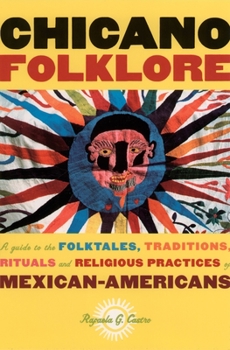Chicano Folklore: A Guide to the Folktales, Traditions, Rituals and Religious Practices of Mexican Americans
Did you know that barrio is a term for a Chicano neighborhood, and that some of the oldest barrios can be found in major U.S. cities, like Los Angeles, Chicago, El Paso, and San Antonio? Or that menudo is actually a soup-type dish made with tripe, the stomach lining of a cow, and typically eaten early in the morning after big holiday celebrations to cure a hangover?
Chicano Folklore is replete with such interesting and often surprising facts about...
Format:Paperback
Language:English
ISBN:0195146395
ISBN13:9780195146394
Release Date:November 2001
Publisher:Oxford University Press, USA
Length:336 Pages
Weight:1.05 lbs.
Dimensions:1.0" x 6.1" x 9.1"
Customer Reviews
2 ratings
A wealth of information
Published by Thriftbooks.com User , 16 years ago
In this politically charged pc world, fueld by fear of illegal immigration from south of the border(meanwhile the terrorsits are probably crossing the porous northern border) the term Chicano is sure to have it's detrators. Fear not, as this book has more to do with essence or embodiment of having Mexican roots and what it entails to be an American of Mexican descent. It is educational. The book deals with the traditions, rituals and religious practises from a historical and contemporary perspective. For example, a non-political and harmless (except for maybe gas) topic like frijoles(beans)is extensively covered from it's historical origins and uses to it's use(beaner) as a derogatory term. This book is an educational tool regardless of your political leanings or beliefs. It seems everyone can learn a little something from this cultural dictionary. Many of the topics can be further explored in music or books like Art and Faith in Mexico: The Nineteenth-Century Retablo Tradition which details the retablos or religious paintings in Mexico or Puro Party which is a band started by a professor of anthropology at San Francisco whose name is Dr. Jose Cuellar. The band, Doctor Loco's Rockin' Jalapeno Band, is made up of musicians who have degrees from prestigious universities who incorporate a variety of Mexican styles into their music. If you are interested in a topic there is probably a book written on the subject somewhere, likewise if you'd like to explore a musical style menioned in the book the various genres are full of talent. This is a very cool(chido) book that explains some of the makeup of what it is to be a Chicano or Mexican-American in these here United States; for that matter, what it is to be an American of Mexicna heritage too. I would recommend this book for a better cultural understanding for all people living in the United States. Recommended for high school school libraries, community centers and public libraries or your own personal reference library.
A valuable storehouse of Mexican-American heritage
Published by Thriftbooks.com User , 19 years ago
The word 'Chicano' is used for an American of Mexican extraction, particularly one living in border areas of New Mexico etc. The word 'Chicano' denotes someone who, despite living in U.S.A. is pure Mexican (and thus is not to be confused with a 'pocho', a term which Chicanos apply to one of their own people who has become too Americanised or 'agringado' (i.e. like a 'gringo' or 'gavacho' - as the American is sometimes called). The chicanos have an extremely rich culture and this excellent reference work is a great tribute to that culture written by an expert. This dictionary is supplemented with a forty page bibliography as well as an index. The entries range from the 'abuelo' (literally 'grandfather' but the term is also used as a synonym with 'coco' which is a kind of bogeyman) to 'Zozobra' (a giant effigy which is burnt). By coincidence the last entry has an indirect relation to the first entry since there is a cross reference to the 'kookooee' which is another form of this effigy (burnt in Santa Fe) and the name of which is derived from the 'cucui' or 'coco' (which , as we have just mentioned, are synonymous with the 'abuelo'). In fact, talkng of the burning of effigies, I also read on p. 222 that at Easter (as in Mexico - and indeed even in many parts of Greece) a life-size effigy of Judas is burnt. The author is careful to provide the correct Chicano Spanish term for all the traditions and customs mentioned. The work covers all aspects of folklore. There are rites of passage: baptism customs and rituals (found in the entry on the 'comadre'/'compadre'), the 'quinceanera'( - spelt with a tilde on the 'n' - this refers to a girl's fifteenth birthday celebration), wedding customs and death customs (e.g. in the entries 'camposanto' or cemetery, 'calavera' or skeleton, the 'Dia de la Muerte' or Day of the Dead and 'la carreta de la muerte' or death cart). There are also entries which feature mythological creatures in folk tales like the 'chanes' or water spirits, the 'duendes' or goblins (distinct from the 'pichilingis' or elves) and the 'chirrionera' or mythical snake. There are many entries which pertain to 'fiestas' and calendar customs. For instance, in connection with the Christmas season there are entries on 'aguinaldos' or carols, 'farolitos' or lanterns, 'matachines','oremos' and the 'pinata'(spelt with a tilde - the clay pot that children break to get the presents and sweets/candies inside). There are also legends such as 'La Llorona' and even some Aztec myths like Aztlan, Quetzalcoatl and Tanantzin etc. The dictionary also contains a few short biographies of notable persons such as La Adelita (feminist symbol) and the pioneering folklorist Fabiola Cabeza de Baca. Food is also represented with entries like the 'burritos'(little donkeys) and 'capirotada', etc. There is a reference to 'curanderismo' or folk healing as well as to the 'huesero' ot bone-setter. Similarly, some words deal with magic and superstition such





